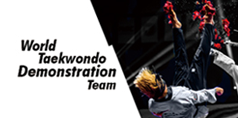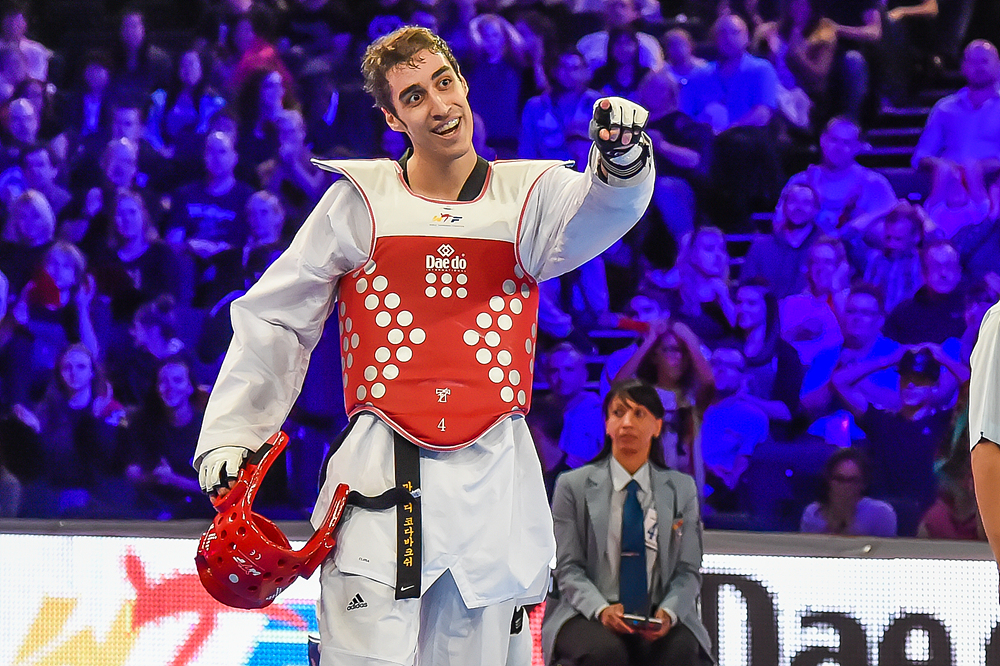Ask any taekwondo pundit what the most dominant fighting machine in the sport is at present, and chances are good that the answer will be two words: “Mahdi Khodabakhshi.”
Although he was sidelined by injury and did not make the just-ended Mexico City Grand Prix Final, the Iranian has won his NOC a spot in Rio 2016 with flying colors. He is the number-one ranked player in the men’s -80kg division – arguably, the fiercest competitive category in the game; he is the current world champion; the 2014 Asian Games champion; and holds three Grand Prix gold medals.
His nickname is “The Terminator” but his surname may be even more appropriate to his phenomenal talent: in Farsi, “Khodabakhshi” means “God Given.”
If that talent was granted by God, it was incubated by his father. The 24-year-old started taekwondo under the tutelage of Khodabakhshi Sr. at the age of four - or, as he puts it himself, “since I grew arms and legs!” It was no easy regimen: “I did not like taekwondo, but my father forced me to do it,” he said. “My whole family practice; my sister is an instructor; my uncles are instructors.”
Now a fourth dan, he has been a staple on the formidable Iranian men’s team for four years and may well be its most valuable property.
The match which planted him firmly on the map was his battle against Aaron Cook in the Manchester Grand Prix Final in 2013. At the time Cook, then fighting for the Isle of Man, was both the number one in the category and a massive and perennial crowd favorite. “It was very interesting, my first time to fight Aaron,” Khodabakhshi recalled. “The whole audience was behind Aaron, and that made me even more motivated to win.”
The Iranian picked off points for an early lead. Cook, however, never says die, and in the third round he surged out like a typhoon, lunging across the mats in a barrage of no-holds-barred assaults, launching combination round kicks and spin kicks. The Iranian kept his cool and fought to keep Cook at distance. “I needed very single point I could get,” Khodabakhshi said. “It was one of the best fights ever.” The final score: 13-11 to the Iranian.
If there is a perfect physique for taekwondo, Khodabakhshi owns it. He is tall, lean and long-limbed.
Althoughhe possesses a weapons-grade front leg, his favorite technique is the jump spinning round kick, unleashed against either body or face. Fighting from a wide, side-on stance, using his hands to feint and employing a dance-like torso movement, he looks confident, dangerous and stylish.
Naturally, he is a crowd pleaser. “I want my audience to enjoy my games,” he said, “But my movement is not intentional – when I watch myself I think, ‘What the hell was I doing?’ I have no idea!”
He credits rigorous training for the development of his killer front leg: “I believe my legs and my backside are my strengths,” he said. “Because of the new system, we have to work hard on front-leg kicks, and that has made my legs very strong.”
The modern game, however, requires more than just physical attributes. “I am very analytical,” he said. “Every person I am going to fight, I analyze.”
But nobody is indestructible – a lesson Khodabakhshi learned in October. A firm favorite for gold at the 2015 Manchester Grand Prix Series 3, he went onto the mats against Team GB’s Lutalo Muhammad in the quarterfinals. The audience, excited to see “The Terminator” take on the home-town boy, went quiet after Khodabakhshi lurched. Clearly, something bad had happened. The Iranian struggled - against obvious agony - to continue, before the fight was halted: He had suffered a severe angle sprain.
Recovery has been slow. In order to make the weight for the GP Series 2 in Samsun, Turkey and Series 3 in Manchester, UK, “I got weaker and lowered my immune system,” Khodabakhshi said. That explains his very conspicuous absence from the Grand Prix Final in Mexico City on December 5-6 this year. However, he expects to be back to full fighting fitness by year-end.
His success on the mats in the 2014 and 2015 seasons – not to mention his reputation as the man to beat - indicate that his conditioning, technique, tactics and training are best-of-breed. But in the months leading up to the Rio Olympics, he plans to radically overhaul his game. “I believe that I am being watched and analyzed by other players, and I don’t want them to read my hand,” he said. “I am going to show you a different Mahdi there.”
The lithe moves and athletic physique that make him so dangerous on the fighting circuit, combined with his good looks, also make him dangerous with the ladies. Asked if he has a girl friend he joked, “About a thousand!” Then he quickly corrected himself. “I don’t break hearts!” he insisted. “If anyone likes me - send me a message!”
When not engaged in the grueling training program of the Iranian taekwondo athletes, he enjoys volleyball and travel. Taekwondo has provided a passport to the world. Spain has been his favorite destination thus far. He also likes cars. He drives a Hyundai, but hopes to own a Maserati. Is that feasible on his current salary as an athlete? “No!” he says – but it may be, “… in a few years, when I have managed to make money out of my titles.”
As a child, he hated taekwondo. Now as a man, he finds it compelling. “Although I was forced to start taekwondo from a young age, as I got older, I learned more about the art,” he said. “The more it became a profession for me, the more I found it interesting.”
Even so, “The Terminator” may hang up his dobok after the 2016 Games.
“I plan to get a gold in the Olympics - I will deliver my best-ever performance! - and then I am not sure if I want to carry on,” he said. “I am under a lot of pressure and stress which affects my personal life. I want to have some sort of calm.”
After what happened in Manchester, there will no more pressure from his taekwondo-centric family.
“My family is very proud and happy as I am successful, but they care about my well-being more than my achievements in taekwondo,” he said. “Since I got injured, they have given up on forcing me to do taekwondo after Rio.”







































